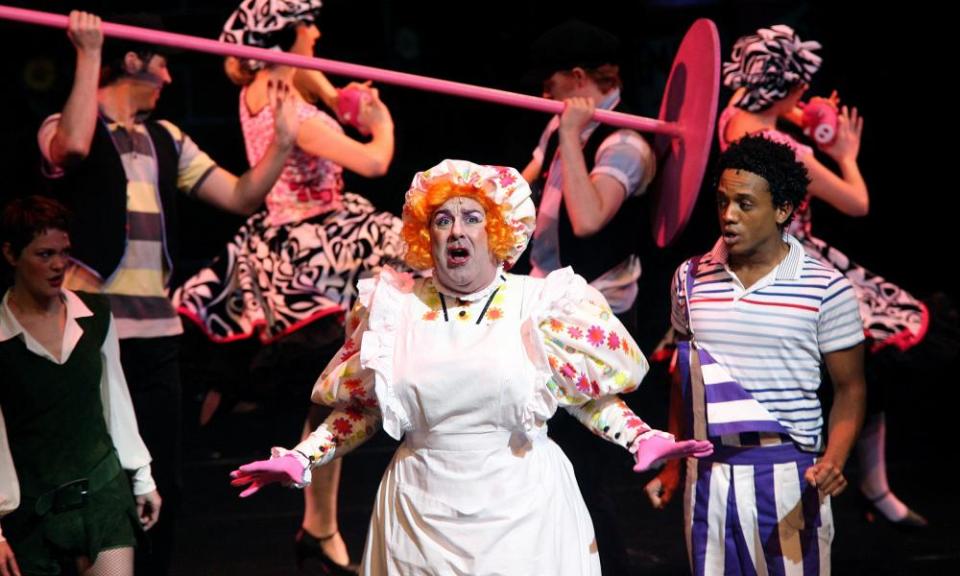Panto king Andy Gray was one of Edinburgh's most revered revellers

It was 2010 and the world of Scottish theatre was reeling from the sudden death of Gerard Kelly, one of the great panto stars. I called a grieving Andy Gray, who had first worked with Kelly on John Byrne’s Still Life in 1982, to get his reaction.
“He did it with such gusto, such conviction,” Gray said of his friend. “A lot of performers say, ‘Oh, I’ve got to do pantomime again,’ and it’s looked down upon, but if you approach it with any cynicism you make it a difficult job for yourself. You’ve got to approach it with ‘I will have fun doing this.’ If you go on thinking, ‘This will be good fun,’ you get the energy from the audience.”
What was true of Kelly was equally so of Gray, who has died aged 61. His almost uninterrupted two-decade run at the heart of the Edinburgh King’s panto was a fun-filled bonanza, a tireless celebration of silliness and joy. There were no dark corners; it was all innocence and delight.
It was a run already curtailed, first by Gray’s recuperation from cancer in 2018, returning for Goldilocks and the Three Bears in 2019, only to be halted again by the pandemic closure of 2020. The thought he will no longer be filling the Tollcross theatre with laughter is hard to contemplate. His panto catchphrase, “I’m no’ very well,” now has a bittersweet tang.
In Edinburgh, Gray was famous for doing pantomime. It is true he had a small-screen profile. People still recognised him decades after he played the dodgy Chancer in City Lights, the late-80s sitcom. He also had a following from Naked Video, a variety of parts in Rab C Nesbitt and, latterly, as a soap star playing Pete Galloway for two years in River City.
But that counted for little to the generations of first-time audiences he delighted at the King’s. They cared only for his hangdog charm, the cheeky twinkle in his eyes and his boundless energy. Give him a word like “balloon” and he could generate hilarity, dropping an octave and revelling in the possibilities of a daft sound.
He was the middle man in a formidable triple act. On one side, Allan Stewart as the Dame was the controlling force, a mother figure sharp enough to match him quip for quip. On the other side, Grant Stott, as the baddie, representing the evil that must be resisted.
Gray, by contrast, was a natural Buttons. He played other panto parts in his time, but none as good a fit as the lovable manchild who never gets the girl. Yet, like all great comic actors, there was something dangerous about him, a sense that at any moment things could go off the rails and chaos ensue.
As a performer, he had learned from the masters and revealed flashes of comedy royalty: the slurred delivery of Tommy Cooper, the mischief of Eric Morecambe, the bewilderment of Stan Laurel.
At Edinburgh’s Royal Lyceum in 1997, he starred in Dead Funny, Terry Johnson’s play about men obsessed with dead comedians. Interviewing him at the time was like flicking through the TV channels. He mentioned Eric Morecambe and instantly the breath was sucked in, the invisible glasses were levered up, and out came a “boom-boom ya-ta-ta-ta”. Then it was Benny Hill, and the eyes looked heavenward in a childlike plea for indulgence. A sentence later, it was Hancock, and he’d come over all morose.
For all his comedic gifts, he was a prolific straight actor. He played Bottom in A Midsummer Night’s Dream, Friar Lawrence in Romeo and Juliet, popped up from time to time in new plays at Edinburgh’s Traverse and Glasgow’s A Play, a Pie and a Pint, and did main-stage tours of popular plays including The Woman who Cooked her Husband and Stones in His Pockets. Quick to laugh, he was a man who loved to play.

 Yahoo Finance
Yahoo Finance 